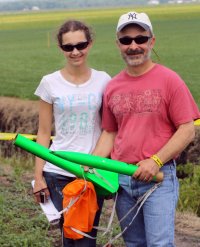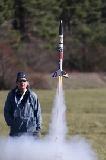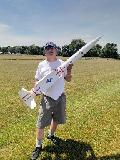- Posts: 11
- Thank you received: 1
Recovery improvement
- JayBarry
- Offline
- New Member
-

Less
More
3 months 5 days ago #12125
by JayBarry
Recovery improvement was created by JayBarry
My son and I are enjoying rocketry a great deal. Unfortunately the part of the hobby we seem to excel at is losing rockets.
We lose a lot of rockets. Yesterday I spent almost the whole launch walking around the neighborhood southwest of the field looking for a boost glider.
Does anyone have anything to share about noisemakers or other auditory aids to locating a rocket? Are they acceptable? I can imagine that having something loud and stuck up in a tree or on a power line where it can’t be recovered would suck for everyone using the space or living near it. But after hours of searching yesterday I also wonder if it would have helped.
We fly a mix of mostly LPR and some MPR, so heavier solutions like GPS or radio beacons don’t seem appropriate.
I guess we could also fly lower and not fly gliders at all, but we really like gliders.
Thanks for any advice or suggestions!
jay
We lose a lot of rockets. Yesterday I spent almost the whole launch walking around the neighborhood southwest of the field looking for a boost glider.
Does anyone have anything to share about noisemakers or other auditory aids to locating a rocket? Are they acceptable? I can imagine that having something loud and stuck up in a tree or on a power line where it can’t be recovered would suck for everyone using the space or living near it. But after hours of searching yesterday I also wonder if it would have helped.
We fly a mix of mostly LPR and some MPR, so heavier solutions like GPS or radio beacons don’t seem appropriate.
I guess we could also fly lower and not fly gliders at all, but we really like gliders.
Thanks for any advice or suggestions!
jay
Please Log in or Create an account to join the conversation.
- ClaudeMaina
-

- Offline
- Administrator
-

Less
More
- Posts: 269
- Thank you received: 15
3 months 4 days ago - 3 months 4 days ago #12126
by ClaudeMaina
Replied by ClaudeMaina on topic Recovery improvement
Here’s my 2 cents. First, I like gliders too and I have a good collection of small and large, rocket and boost gliders. But I only fly them on days with no wind or little wind blowing in the the right direction. My best advice is; Discretion is the better part of valor; or in other words: He who attends a launch and walks away, lives to fly another day.
There are a number of commercial beepers. I have a few and they all work well. I wouldn’t worry about a rocket landing in a tree or power lines with a beeper. It may be annoying at first, but the battery will eventually die. I have also used Apple’s AirTag. They are cheap and work well. But you have to have an iPhone.
But mostly, I just choose a set of rockets for the particular launch field and weather conditions the day of the launch. I have some rockets that fly only with no wind, some with moderate wind and some that can fly in any condition. I also have some rockets that I don’t care if I lose and some that I won’t risk losing.
At the launch, I do a lot of observing - how big, how high, what motor, how fast they’re drifting and where, where they’re landing, etc. That all helps me decide what to fly, or whether to fly at all.
Finally, everyone loses rockets. That is just part of the hobby. The trick is to keep it to a minimum.
There are a number of commercial beepers. I have a few and they all work well. I wouldn’t worry about a rocket landing in a tree or power lines with a beeper. It may be annoying at first, but the battery will eventually die. I have also used Apple’s AirTag. They are cheap and work well. But you have to have an iPhone.
But mostly, I just choose a set of rockets for the particular launch field and weather conditions the day of the launch. I have some rockets that fly only with no wind, some with moderate wind and some that can fly in any condition. I also have some rockets that I don’t care if I lose and some that I won’t risk losing.
At the launch, I do a lot of observing - how big, how high, what motor, how fast they’re drifting and where, where they’re landing, etc. That all helps me decide what to fly, or whether to fly at all.
Finally, everyone loses rockets. That is just part of the hobby. The trick is to keep it to a minimum.
Last edit: 3 months 4 days ago by ClaudeMaina.
Please Log in or Create an account to join the conversation.
- RHobbs1
-

- Offline
- Senior Member
-

Less
More
- Posts: 62
- Thank you received: 4
3 months 4 days ago #12127
by RHobbs1
Replied by RHobbs1 on topic Recovery improvement
If you don't want to lose rockets, then don't fly them. I know, where's the fun in that!
I lost my Custom Rockets Liberty on the same neighborhood last month, so I feel your pain I think it's on the roof of that industrial building. I deliberately chose a smaller chute, but it was a 12" nylon without a spill hole from Happy Chutes instead of one of my stock Estes chutes with a spill hole.
I always cut spill holes in my chutes. I believe it helps them deploy more easily and it does bring the rocket down faster.
One thing I've found is that the cutest supplied with the Estes kits are actually larger than they need to be. For example, I cloned an Astron Avenger two-stager a few years ago and the kit instructions say it comes with an 18" chute. I flew it on a 15" once and after that I've been flying it on 12' every time. And it can still travel. My Liberty came with a 14" which is actually reasonable, but only for light wind or larger fields like Amesbury.
My goal at this past launch was to simply land everything on the field. By using smaller chutes carefully gauging the launch angle and direction I was largely successful. My final launch of the day landed in the Tall stuff just south of the field under
the wires but it was easily found.
I did break a fin off of my Arcas and damaged one on my Citation Patriot cluster because of the shorter grass and smaller chutes, but at least I got them back and they were easily repaired.
As for gliders, I did see yours heading for the trees on the other side of the house south of the field.
I noticed it was trimmed out for a very broad turn. I try to trim mine out for a tighter turn radius, say, 100-200'. Unless you're going for duration in competition, you want a tighter turn to increase the chances of landing the glider on the field.
Like Claude mentioned above, I only try to fly gliders in as near-perfect weather as possible. And the rockets I flew at the last launch were either ones I thought I would get back or ones that I wouldn't mind losing. I can always build more rockets.
I'm truly sorry you lost that glider, it looked so cool in the RSO line and it had a really nice finish on it. It sucks to lose rockets, but the only way you can really lose in this game is to quit.
I lost my Custom Rockets Liberty on the same neighborhood last month, so I feel your pain I think it's on the roof of that industrial building. I deliberately chose a smaller chute, but it was a 12" nylon without a spill hole from Happy Chutes instead of one of my stock Estes chutes with a spill hole.
I always cut spill holes in my chutes. I believe it helps them deploy more easily and it does bring the rocket down faster.
One thing I've found is that the cutest supplied with the Estes kits are actually larger than they need to be. For example, I cloned an Astron Avenger two-stager a few years ago and the kit instructions say it comes with an 18" chute. I flew it on a 15" once and after that I've been flying it on 12' every time. And it can still travel. My Liberty came with a 14" which is actually reasonable, but only for light wind or larger fields like Amesbury.
My goal at this past launch was to simply land everything on the field. By using smaller chutes carefully gauging the launch angle and direction I was largely successful. My final launch of the day landed in the Tall stuff just south of the field under
the wires but it was easily found.
I did break a fin off of my Arcas and damaged one on my Citation Patriot cluster because of the shorter grass and smaller chutes, but at least I got them back and they were easily repaired.
As for gliders, I did see yours heading for the trees on the other side of the house south of the field.
I noticed it was trimmed out for a very broad turn. I try to trim mine out for a tighter turn radius, say, 100-200'. Unless you're going for duration in competition, you want a tighter turn to increase the chances of landing the glider on the field.
Like Claude mentioned above, I only try to fly gliders in as near-perfect weather as possible. And the rockets I flew at the last launch were either ones I thought I would get back or ones that I wouldn't mind losing. I can always build more rockets.
I'm truly sorry you lost that glider, it looked so cool in the RSO line and it had a really nice finish on it. It sucks to lose rockets, but the only way you can really lose in this game is to quit.
Please Log in or Create an account to join the conversation.
- deangelo54
-

- Offline
- Platinum Member
-

Less
More
- Posts: 699
- Thank you received: 39
3 months 4 days ago - 3 months 4 days ago #12128
by deangelo54
Replied by deangelo54 on topic Recovery improvement
It is easy to lose a rocket in Acton if you are not careful. I keep a spreadsheet of my rockets where I list the weight (unloaded) and what engines I can fly them on without losing them. I attached a modified version for the Acton field. For lighter rockets with bigger engines, you have to take the wind into consideration. I like to observe other flights to see what engine is being used, how high the rocket flew and if it was recovered.
At the field, I write down the rocket name, engine, chute size and results of the flight and recovery. At home, I enter that information into a spreadsheet. Then I can look back to see what rocket, engine and chute combination makes for a recoverable flight.
At the field, I write down the rocket name, engine, chute size and results of the flight and recovery. At home, I enter that information into a spreadsheet. Then I can look back to see what rocket, engine and chute combination makes for a recoverable flight.
Last edit: 3 months 4 days ago by deangelo54.
Please Log in or Create an account to join the conversation.
- JayBarry
- Offline
- New Member
-

Less
More
- Posts: 11
- Thank you received: 1
2 months 3 weeks ago #12138
by JayBarry
Replied by JayBarry on topic Recovery improvement
Thanks everyone for your advice. We're going to make a few changes, including doing more observation of other flights and putting up some smaller and less-treasured rockets before sending the cool new shiny stuff. We'll see how long that lasts in the face of an 11 year old's enthusiasm and energy.
There is a happy ending to this story! A neighbor of the field texted me on Friday and let me know that he found the glider. We got it back and its in decent shape considering all the time it spent outside, so we may get a shot at redemption.
Jay
There is a happy ending to this story! A neighbor of the field texted me on Friday and let me know that he found the glider. We got it back and its in decent shape considering all the time it spent outside, so we may get a shot at redemption.
Jay
Please Log in or Create an account to join the conversation.
- ClaudeMaina
-

- Offline
- Administrator
-

Less
More
- Posts: 269
- Thank you received: 15
2 months 3 weeks ago #12139
by ClaudeMaina
Replied by ClaudeMaina on topic Recovery improvement
Great news! It's rare that a lost rocket is then found and returned - and really neat when it happens! Congratulations!!
Please Log in or Create an account to join the conversation.
